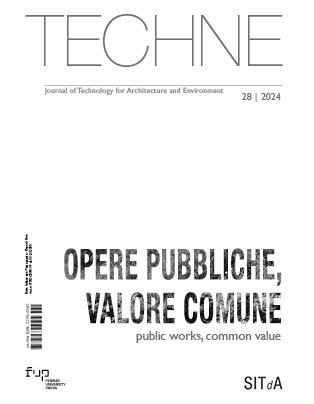Published 2024-10-29
Keywords
- Ecological transition,
- Energy citizenship,
- Participatory processes,
- Renewable Energy Communities,
- Student citizenship
How to Cite
Copyright (c) 2024 Beatrice Turillazzi, Andrea Boeri, Saveria Olga Murielle Boulanger , Francesca Sabatini, Carlotta Trippa

This work is licensed under a Creative Commons Attribution 4.0 International License.
Funding data
-
Horizon 2020 Framework Programme
Grant numbers 101022317 -
Università di Bologna
-
Regione Emilia-Romagna
Abstract
The promotion of participatory processes in initiatives such as Energy Communities (ECs) can prompt behavioural change in ecological transition. The paper presents the experience of the Municipality of Cesena and the University in the EN-ACTION project aimed at increasing awareness among students and citizens about energy transition through initiatives involving various stakeholders. The first section outlines the state of the art on energy citizenship and universities in ecological transition. The methodological section illustrates the participatory approach of EN-ACTION. The third section describes the results. The conclusions emphasise the central role of active citizenship in the transition, and the role of the public in shared management of energy.
Downloads
References
- Alhaj, A.A.M. and Alwadai, M.A.M. (2023), “The role of general joint courses in promoting citizenship values among university students from the perspectives of students at King Khalid University”, Technium Social Sciences Journal, Vol. 39, pp. 166-183. Available at: https://doi.org/10.47577/tssj.v39i1.8077. DOI: https://doi.org/10.47577/tssj.v39i1.8077
- Beauchampet, I., Walsh, B., (2021), “Energy citizenship in the Netherlands: The complexities of public engagement in a large-scale energy transition”, Energy Research & Social Science, Vol. 76, 102056. Available at: https://doi.org/10.1016/j.erss.2021.102056. DOI: https://doi.org/10.1016/j.erss.2021.102056
- Carlson, J.L., Haffenden, R.A., Bassett, G.W., Buehring, W.A., Collins, I.I.I., Folga, S.M., Petit, F.D., Phillips, J.A., Verner, D.R., Whitfield, R.G. (2012), Resilience: Theory and Application. Argonne National Lab. 630 (ANL), Argonne, IL (United States). Available at: https://doi.org/10.2172/1044521. DOI: https://doi.org/10.2172/1044521
- Fachrudin, H.T. and Fachrudin, K. A. (2021), “Factors influencing energy conservation application in green campus design based on green behavior”, International Journal of Energy Economics and Policy, 11(4), 511-520. Available at: https://doi.org/10.32479/ijeep.11355. DOI: https://doi.org/10.32479/ijeep.11355
- European Commission (2019a), Orientations towards the first Strategic Plan for Horizon Europe. Directorate Research and Innovation. Available at: https://research-and-innovation.ec.europa.eu/document/download/fd318c10-657f-4430-b2a1-023f3c5a02e2_en?filename=ec_rtd_orientations-he-strategic-plan_122019.pdf (Accessed on 02/02/2024).
- European Commission (2019b), A European Green Deal. European Commission – European Commission. Available at: https://ec.europa.eu/info/strategy/priorities-2019-2024/european-green-deal_en (Accessed on 02/02/2024).
- Gifford, C., Watt, P., Clark, W. and Koster, S. (2005), “Negotiating participation and power in a school setting: the implementation of active citizenship within the undergraduate sociology curriculum”, LATISS: Learning and Teaching in the Social Sciences, 2(3), 175-190. Available at: https://doi.org/10.1386/ltss.2.3.175/1. DOI: https://doi.org/10.1386/ltss.2.3.175/1
- GreenMetric. Available at: https://greenmetric.ui.ac.id (accessed Feb 18th, 2024).
- Iaione, F.C. and De Nictolis, E. (2016), “La quintupla elica come approccio alla governance dell’innovazione sociale” in Montanari, F and Mizzau, L. (a cura di), I luoghi dell’innovazione aperta. Modelli di sviluppo territoriale e inclusione sociale, Quaderni Fondazione Giacomo Brodolini Studi e ricerche, Vol. 5, pp. 75-89.
- IPCC (2022a), Climate Change 2022: Impacts, Adaptation, and Vulnerability. Contribution of Working Group II to the Sixth Assessment Report of the Intergovernmental Panel on Climate Change, Cambridge University Press. ed. Cambridge.
- IPCC (2022b), Climate Change 2022: Mitigation of Climate Change. Contribution of Working Group III to the Sixth Assessment Report of the Intergovernmental Panel on Climate Change, Cambridge University Press, Cambridge, UK and New York, NY, USA.
- Lennon, B., Dunphy, N., Gaffney, C., Revez, A., Mullally, G., O’Connor, P. (2020), “Citizen or consumer? Reconsidering energy citizenship”, Journal of Environmental Policy & Planning, 22, 184-197. Available at: https://doi.org/10.1080/1523908X.2019.1680277. DOI: https://doi.org/10.1080/1523908X.2019.1680277
- Li, X., Xu, X., Li, J., and Liu, X. (2019), “Investigation on the application of green energy resource and energy saving and emission reduction technology in Beijing colleges and universities and its countermeasures and suggestions taking north China electric power university as an example”, Proceedings of the 4th International Conference on Contemporary Education, Social Sciences and Humanities (ICCESSH 2019). Available at: https://doi.org/10.2991/iccessh-19.2019.381. DOI: https://doi.org/10.2991/iccessh-19.2019.381
- Longo, D., Boulanger, S. O. M., Massari, M. and Turci, G. (2023), “Energy citizenship. Tools and technologies to enable transition in districts”, TECHNE – Journal of Technology for Architecture and Environment, (25), 84-92. Available at: https://doi.org/10.36253/techne-13721. DOI: https://doi.org/10.36253/techne-13721
- Pörtner, H.O., Roberts, D.C., Poloczanska, E.S., Mintenbeck, K., Tignor, M., Alegría, A., and Okem, A. (2022), IPCC, 2022: Summary for policymakers. Available at: https://www.ipcc.ch/report/ar6/wg2/chapter/summary-for-policymakers/ (Accessed on 02/02/2024).
- Rete Università Sostenibili, Available at https://reterus.it (Accessed on 02/02/2024).
- Schlindwein, L. and Montalvo, C. (2022), “Accounting for heterogenous behaviours within transformative policy-making: the case of Energy Citizenship”, in Proceedings of the EU-SPRI 2022 Conference, Utrecht, The Netherlands, pp. 1-3. DOI: https://doi.org/10.2139/ssrn.4264185
- Schot, J., Kanger, L, Verbong, G. (2016), “The roles of users in shaping transitions to new energy systems”, Nature Energy, 1, 1-7. DOI: https://doi.org/10.1038/nenergy.2016.54
- Sovacool, B.K., Turnheim, B., Martiskainen, M., Brown, D., Kivimaa, P. (2020), “Guides or gatekeepers? Incumbent-oriented transition intermediaries in a low-carbon era”, Energy Research & Social Science, 66, 101490. Available at: https://doi.org/10.1016/j.erss.2020.101490. DOI: https://doi.org/10.1016/j.erss.2020.101490






